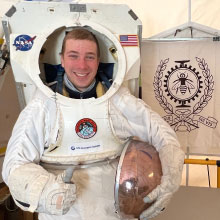Nouvelles
A Quebec first: Creation of a scientific diplomacy chair specializing in Far North and outer space issues
Polytechnique Montréal is home to Quebec’s first international research chair in science diplomacy, dedicated to the challenges of the Far North and outer space. Named the International Science Diplomacy Research Chair for Arctic and Space Cooperation, it will address the environmental, technological, and diplomatic issues associated with the responsible and sustainable use of extreme environments.

Pooneh Maghoul will serve as Chairholder and Scientific Director of the International Science Diplomacy Research Chair for Arctic and Space Cooperation (Photo : Caroline Perron)
Pooneh Maghoul, a full professor in the Department of Civil, Geological and Mining Engineering at Polytechnique Montréal, will serve as Senior Chairholder and Scientific Director. She will be supported in her new tasks by her colleagues Thomas Stringer, Assistant Professor in the Department of Mathematics and Industrial Engineering, and Richard Boudreault, Associate Professor in the Department of Civil, Geological and Mining Engineering.
The Chair’s work will cover six main areas. They range from energy transition and afforestation to responsible resource extraction, the environmental protection and sustainability of Earth-space systems, responsible exploration, sustainable presence in space and the impact of melting permafrost on northern infrastructure.
In addition to training a new generation of technodiplomats, the Chair will aim to build a scientific and diplomatic platform to facilitate dialogue between scientists, engineers, legal experts and policy-makers. It will endeavour to shed light on emerging legal, political and technological frameworks related to extreme environments.
“The northern regions and outer space face many shared challenges, including sustainability, sovereignty and state jurisdiction, and international cooperation,” says Pooneh Maghoul. “By placing science at the service of peace and climate justice, we recognize the fragility of these environments and the need for development that respects both ecosystems and the peoples who inhabit them. Using a holistic approach, we aim to become a leading authority on sustainable development in the North and outer space.”
Global Science Diplomacy Hub
Based at Polytechnique Montréal, the Chair is a unique transdisciplinary program dedicated to advancing scientific and technological collaboration in extreme and geopolitically sensitive environments. Professor Maghoul will be joined by three international co-chairholders: Paul Arthur Berkman, founder of the Science Diplomacy Center (U.S.), Philippe Achilleas, Professor of Public Law at Université Paris-Saclay (France), and Miriam Aczel, researcher at the United Nations University Institute for Water, Environment and Health (UNU-INWEH, Canada).
The Chair is one of seven initiatives receiving funding of $50,000 per year for five years from the Fonds de recherche du Québec (FRQ). Polytechnique and several international partners also contribute to its funding.
Adopting a collaborative approach, the Chair will advise governments and Indigenous organizations and communities, helping them make decisions based on technical considerations, foreseeable risks, safety, social acceptability and cost, while taking into account the priorities, values and lifestyles of all stakeholders. The Chair will also award scholarships, establish a summer school and set up a lab-to-policy program. An annual event will be held, rotating between Montreal, Boston and Paris.
Bringing science to the heart of policy decisions
François Bertrand, Director of Research and Innovation at Polytechnique Montréal, welcomes the initiative while emphasizing the importance of ensuring that development policy decisions are grounded in scientific evidence.
“This is particularly important in fragile environments such as the Arctic, and in those undergoing significant change, such as outer space”, he notes, adding that Northern development, just like space exploitation, must be pursued collaboratively.
“The Chair will provide guidance to policy-makers at a time when more and more countries are eyeing these sites for obvious economic reasons, including critical minerals, and for defense purposes,” he adds.“This program will help train a new generation of engineers and scientists, raise their awareness of sociopolitical, economic and environmental issues, and equip them to guide science-based policy decisions for the common good, with respect for communities.”
Learn more
International Science Diplomacy Research Chair for Arctic and Space Cooperation website
Professor Pooneh Maghoul expertise
Civil, Geological and Mining Engineering Department website




